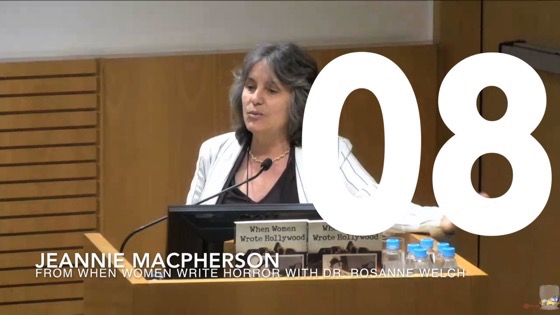Watch this entire presentation
Subscribe to Rosanne’s Channel and receive notice of each new video!
Transcript:
So unreliable narrators are something we have to look at when we’re doing our own research or study about films. In this case, we have a woman named Jeannie Macpherson and a gentleman who you may or may not have heard, if if you know about early American films Cecil B. DeMille. Mostly if I teach this woman’s work people have heard of him they have never heard of her because when he outlived her and gave an interview to the Academy of Motion Pictures in oral history, he said — after she was long dead — she didn’t do much work I did most of it. She had some nice ideas but I was the one who did all the real work. But if you do the research, all the movies that he made that were blockbusters she wrote and when she didn’t write his films they did not make money. Why would he have kept her on board for 20 years of filmmaking if she did so very little but she didn’t live long enough to give her own oral history and he did.
A Note About This Presentation
A clip from my keynote speech at the 10th Screenwriters´(hi)Stories Seminar for the interdisciplinary Graduation Program in “Education, Art, and History of Culture”, in Mackenzie Presbyterian University, at São Paulo, SP, Brazil, focused on the topic “Why Researching Screenwriters (has Always) Mattered.” I was especially pleased with the passion these young scholars have toward screenwriting and it’s importance in transmitting culture across the man-made borders of our world.
To understand the world we have to understand its stories and to understand the world’s stories we must understand the world’s storytellers. A century ago and longer those people would have been the novelists of any particular country but since the invention of film, the storytellers who reach the most people with their ideas and their lessons have been the screenwriters. My teaching philosophy is that: Words matter, Writers matter, and Women writers matte, r so women writers are my focus because they have been the far less researched and yet they are over half the population. We cannot tell the stories of the people until we know what stories the mothers have passed down to their children. Those are the stories that last. Now is the time to research screenwriters of all cultures and the stories they tell because people are finally recognizing the work of writers and appreciating how their favorite stories took shape on the page long before they were cast, or filmed, or edited. But also because streaming services make the stories of many cultures now available to a much wider world than ever before.
Many thanks to Glaucia Davino for the invitation.
* A portion of each sale from Amazon.com directly supports our blogs
** Many of these books may be available from your local library. Check it out!
† Available from the LA Public Library
Podcast: Play in new window | Download
Subscribe: RSS
